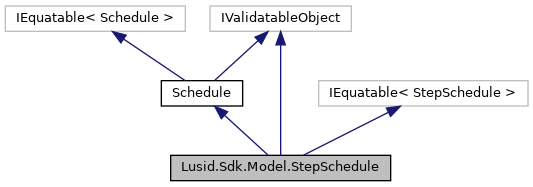Schedule that steps at known dated points in time. Used in representation of a sinking bond, also called amortisation, steps in coupons for fixed bonds and spreads for floating bonds. More...

Public Member Functions | |
| StepSchedule (string levelType=default(string), string stepScheduleType=default(string), List< LevelStep > steps=default(List< LevelStep >), ScheduleTypeEnum scheduleType=default(ScheduleTypeEnum)) | |
| Initializes a new instance of the StepSchedule class. More... | |
| override string | ToString () |
| Returns the string presentation of the object More... | |
| override string | ToJson () |
| Returns the JSON string presentation of the object More... | |
| override bool | Equals (object input) |
| Returns true if objects are equal More... | |
| bool | Equals (StepSchedule input) |
| Returns true if StepSchedule instances are equal More... | |
| override int | GetHashCode () |
| Gets the hash code More... | |
 Public Member Functions inherited from Lusid.Sdk.Model.Schedule Public Member Functions inherited from Lusid.Sdk.Model.Schedule | |
| Schedule (ScheduleTypeEnum scheduleType=default(ScheduleTypeEnum)) | |
| Initializes a new instance of the Schedule class. More... | |
| override string | ToString () |
| Returns the string presentation of the object More... | |
| override bool | Equals (object input) |
| Returns true if objects are equal More... | |
| bool | Equals (Schedule input) |
| Returns true if Schedule instances are equal More... | |
| override int | GetHashCode () |
| Gets the hash code More... | |
Protected Member Functions | |
| StepSchedule () | |
| Initializes a new instance of the StepSchedule class. More... | |
| IEnumerable< System.ComponentModel.DataAnnotations.ValidationResult > | BaseValidate (ValidationContext validationContext) |
| To validate all properties of the instance More... | |
 Protected Member Functions inherited from Lusid.Sdk.Model.Schedule Protected Member Functions inherited from Lusid.Sdk.Model.Schedule | |
| Schedule () | |
| Initializes a new instance of the Schedule class. More... | |
| IEnumerable< System.ComponentModel.DataAnnotations.ValidationResult > | BaseValidate (ValidationContext validationContext) |
| To validate all properties of the instance More... | |
Properties | |
| string | LevelType [get, set] |
| The type of shift or adjustment that the quantity represents. Supported string (enumeration) values are: [Absolute, AbsoluteShift, Percentage, AbsolutePercentage]. More... | |
| string | StepScheduleType [get, set] |
| The type of step that this schedule is for. Supported string (enumeration) values are: [Coupon, Notional, Spread]. More... | |
| List< LevelStep > | Steps [get, set] |
| The level steps which are applied. More... | |
 Properties inherited from Lusid.Sdk.Model.Schedule Properties inherited from Lusid.Sdk.Model.Schedule | |
| ScheduleTypeEnum | ScheduleType [get, set] |
| The available values are: FixedSchedule, FloatSchedule, OptionalitySchedule, StepSchedule, Exercise, FxRateSchedule, FxLinkedNotionalSchedule, Invalid More... | |
Additional Inherited Members | |
 Public Types inherited from Lusid.Sdk.Model.Schedule Public Types inherited from Lusid.Sdk.Model.Schedule | |
| enum class | ScheduleTypeEnum { FixedSchedule = 1 , FloatSchedule = 2 , OptionalitySchedule = 3 , StepSchedule = 4 , Exercise = 5 , FxRateSchedule = 6 , FxLinkedNotionalSchedule = 7 , Invalid = 8 } |
| The available values are: FixedSchedule, FloatSchedule, OptionalitySchedule, StepSchedule, Exercise, FxRateSchedule, FxLinkedNotionalSchedule, Invalid More... | |
Detailed Description
Schedule that steps at known dated points in time. Used in representation of a sinking bond, also called amortisation, steps in coupons for fixed bonds and spreads for floating bonds.
Constructor & Destructor Documentation
◆ StepSchedule() [1/2]
|
inlineprotected |
Initializes a new instance of the StepSchedule class.
◆ StepSchedule() [2/2]
|
inline |
Initializes a new instance of the StepSchedule class.
- Parameters
-
levelType The type of shift or adjustment that the quantity represents. Supported string (enumeration) values are: [Absolute, AbsoluteShift, Percentage, AbsolutePercentage]. (required). stepScheduleType The type of step that this schedule is for. Supported string (enumeration) values are: [Coupon, Notional, Spread]. (required). steps The level steps which are applied. (required). scheduleType The available values are: FixedSchedule, FloatSchedule, OptionalitySchedule, StepSchedule, Exercise, FxRateSchedule, FxLinkedNotionalSchedule, Invalid (required) (default to "StepSchedule").
Member Function Documentation
◆ BaseValidate()
|
inlineprotected |
To validate all properties of the instance
- Parameters
-
validationContext Validation context
- Returns
- Validation Result
◆ Equals() [1/2]
|
inline |
Returns true if objects are equal
- Parameters
-
input Object to be compared
- Returns
- Boolean
◆ Equals() [2/2]
|
inline |
Returns true if StepSchedule instances are equal
- Parameters
-
input Instance of StepSchedule to be compared
- Returns
- Boolean
◆ GetHashCode()
|
inline |
Gets the hash code
- Returns
- Hash code
◆ ToJson()
|
inlinevirtual |
Returns the JSON string presentation of the object
- Returns
- JSON string presentation of the object
Reimplemented from Lusid.Sdk.Model.Schedule.
◆ ToString()
|
inline |
Returns the string presentation of the object
- Returns
- String presentation of the object
Property Documentation
◆ LevelType
|
getset |
The type of shift or adjustment that the quantity represents. Supported string (enumeration) values are: [Absolute, AbsoluteShift, Percentage, AbsolutePercentage].
The type of shift or adjustment that the quantity represents. Supported string (enumeration) values are: [Absolute, AbsoluteShift, Percentage, AbsolutePercentage].
◆ Steps
|
getset |
The level steps which are applied.
The level steps which are applied.
◆ StepScheduleType
|
getset |
The type of step that this schedule is for. Supported string (enumeration) values are: [Coupon, Notional, Spread].
The type of step that this schedule is for. Supported string (enumeration) values are: [Coupon, Notional, Spread].
The documentation for this class was generated from the following file:
- /home/docs/checkouts/readthedocs.org/user_builds/lusid-sdk-csharp/checkouts/latest/sdk/Lusid.Sdk/Model/StepSchedule.cs